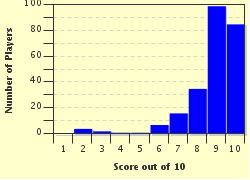Quiz Answer Key and Fun Facts
1. "Tomorrow I'll think of some way to get him back. After all, tomorrow is another day." What is the name of the character who delivers this determined statement at the end of 'Gone with the Wind' by Margaret Mitchell?
2. "The offing was barred by a black bank of clouds, and the tranquil waterway leading to the uttermost ends of the earth flowed sombre under an overcast sky - seemed to lead into the heart of an immense darkness." This is the last line of 'Heart of Darkness' by Joseph Conrad. On what river is this novel set?
3. "'Excellently observed,' answered Candide; 'but we must cultivate our garden.'" What French author wrote the book which finishes with the title character making this statement?
4. "Yes, she thought, laying down her brush in extreme fatigue, I have had my vision." Who was the author of 'To the Lighthouse', which concludes in this fashion?
5. "Then starting home, he walked toward the trees, and under them, leaving behind him the big sky, the whisper of wind voices in the wind-bent wheat." The close of Truman Capote's 'In Cold Blood' captures the alienated feeling that infuses much of the book. In which American state is it set?
6. "He loved Big Brother." George Orwell concluded which of his books in this fashion?
7. "Don't ever tell anybody anything. If you do, you start missing everybody." These are the despairing last words of the protagonist of J. D. Salinger's 'The Catcher in the Rye'. What is his name?
8. "So we beat on, boats against the current, borne back ceaselessly into the past." Which Jazz Age novel by F. Scott Fitzgerald finishes with this line?
9. "As you from crimes would pardoned be, / Let your indulgence set me free." This is the finishing line of Shakespeare's play 'The Tempest'. What character delivers it?
10. The final example of a final sentence is much too long to include here, as it has something like 4000 words. What novel did James Joyce finish with a passage often referred to as Molly Bloom's Soliloquy?
Source: Author
looney_tunes
This quiz was reviewed by FunTrivia editor
LadyCaitriona before going online.
Any errors found in FunTrivia content are routinely corrected through our feedback system.


